- Home
- Barry Lyga
The Flash: The Tornado Twins
The Flash: The Tornado Twins Read online
My name is Barry Allen, and I’m the fastest man alive.
A particle accelerator explosion sent a bolt of lightning into my lab one night, shattering a shelf of containers and dousing me in electricity and chemicals. When I woke up from a coma nine months later, I found I was gifted with superspeed.
Since then, I’ve worked to keep Central City and its people safe from those with evil intent. With the help of my friends Caitlin and Cisco at S.T.A.R. Labs; my girlfriend, Iris; her brother, Wally; and my adoptive father, Joe, I’ve battled time travelers, mutated freaks, and metahumans of every stripe.
I’ve tried to reconcile my past, learned some tough lessons, and—most important of all—never, ever stopped moving forward.
I am . . .
To Paul Levitz and Keith Giffen. They didn’t invent the future, but they sure gave it an upgrade!
PUBLISHER’S NOTE: This is a work of fiction. Names, characters, places, and incidents are either the product of the author’s imagination or used fictitiously, and any resemblance to actual persons, living or dead, business establishments, events, or locales is entirely coincidental.
Cataloging-in-Publication Data has been applied for and may be obtained from the Library of Congress.
ISBN 978-1-4197-3124-2
eISBN 978-1-68335-390-4
Copyright © 2018 DC Comics.
THE FLASH and all related characters and elements © and ™ DC Comics. WB SHIELD: ™ & © Warner Bros. Entertainment. (s18)
ABBO40251
Cover illustration by César Moreno
Book design by Chad W. Beckerman
Published in 2018 by Amulet Books, an imprint of ABRAMS. All rights reserved. No portion of this book may be reproduced, stored in a retrieval system, or transmitted in any form or by any means, mechanical, electronic, photocopying, recording, or otherwise, without written permission from the publisher.
Amulet Books® is a registered trademark of Harry N. Abrams, Inc.
Amulet Books are available at special discounts when purchased in quantity for premiums and promotions as well as fundraising or educational use. Special editions can also be created to specification. For details, contact [email protected] or the address below.
ABRAMS The Art of Books
195 Broadway, New York, NY 10007
abramsbooks.com
As Barry Allen knows well, no matter how fast you are, you can’t outrun your problems.
First, a techno-wizard named Hocus Pocus came to Central City and made the Flash his plaything. After some hard work, fast feet, and quick thinking, Barry and his friends were able to trick the villain at his own game. Things were almost back to normal, until Hocus Pocus vanished from a secure cell in the Pipeline.
Desperate to figure out Hocus Pocus’s insanely advanced technology, Barry set out for Earth 2 and some help from Harrison Wells. But his trip went awry, and he ended up on Earth 27, where all the people he knew as heroes back home were villains, and vice versa. With the help of the Rogues (who were good guys on Earth 27) and the mysterious Madame Xanadu, Barry defeated the evil speedster Johnny Quick and returned to Earth 1. He didn’t come home empty-handed, either; he gained the knowledge of Johnny Quick’s “speed mantra,” which unlocked a direct connection to HyperHeaven and made Barry faster than ever before.
Now he’s going to need that speed! Back on Earth 1, Earthworm continues his killing spree in the sewers. While Barry was away, Kid Flash headed down there to stop him. He was ambushed and now is trapped in the dark, helpless as hundreds of rats converge on him. And Barry’s job at CCPD hangs by a thread. On top of all that, Cisco has vibed an eerie truth about Hocus Pocus: He’s from the future. Really, really far in the future. Like, thousands of years in the future.
And Barry is determined to go get him . . .
1
“Ok,” Said Cisco Ramon, “Here’s the problem—”
“We’re all listening,” H.R. promised.
Cisco sighed at the interruption. He was standing before one of the many transparent dry-erase boards in the S.T.A.R. Labs Cortex, wielding a black marker. H.R. leaned casually against a desk; Caitlin sat forward in her chair, elbows on knees, her chin perched on her fists.
And Barry Allen—the Flash—leaned against the doorjamb, his arms crossed over his chest. His face was a study in focus, his eyes thirsty for understanding, his lips set in a grim, determined line.
“Go on, Cisco,” he said calmly. “H.R., please be quiet.”
H.R. opened his mouth, then thought better of it and saluted instead.
“We all know about parallel worlds,” Cisco said, and he proceeded to draw a series of overlapping circles on the board. “Fifty-two variants of our own universe, all occupying the same physical space but separated by vibrational frequencies. So far, so easy.” He paused, as though expecting an interruption, and glanced meaningfully at H.R., who mimed pulling a zipper over his mouth.
With a pleased expression, Cisco continued. He drew a line on the board. “So, this is one universe in the Multiverse. Time flows in one direction—from the present into the future. Again, easy. But there’s a theory that says that each universe in the Multiverse contains its own specific variants. That each choice we make in this universe splits the timeline, creating alternate versions.” He sketched scattered lines branching off from the main line. “Eat pizza for lunch—that’s one version of the future. Eat a P, B, and J—that’s another one. Most of the variants aren’t different enough to matter. You’d never notice the difference—”
“Unless you looked at your napkin,” H.R. offered.
Cisco groaned. “You’d rarely notice the difference. But in some cases . . . In some cases, there are big enough changes that one version of the future could be unrecognizable as compared to another. Same timeline, same universe, different outcomes.”
The board was now a flurry of lines breaking off from the main one. It seemed hopeless.
“Lotta possibilities,” Cisco continued. “We need to make sure you find your way through all this mess to the proper future, the one timeline that results in the Hocus Pocus who came back in time to challenge you.”
More silence. You could almost hear brains churning.
“All water runs to the sea,” Barry said into the quiet.
Everyone turned to him. “What was that?” Caitlin asked.
Barry strolled to the board and took a red marker from the cradle. “Pretend the main branch of the timeline is a river. All these breakouts that Cisco drew”—he circled a bunch of them in red—“are what potamologists—people who study rivers, H.R.—call distributaries, where the water flows outside the normal bed. But . . .”
At the mention of the word distributaries, Cisco flinched. Barry noticed but said nothing and went on. With a flourish, he began extending the distributaries, adding to them with his red marker, curving them back until they reconnected with the main timeline again, then circling big red loops around the terminus, where all lines intersected.
“For the most part, bodies of water flow from smaller to bigger to biggest. Distributaries eventually become tributaries, which recombine with the main river and flow to the biggest body of water, the sea. Or, in this case, the future.”
Cisco shook his head. “Yeah, I’ve thought of that, but the more I brain it out, the more I’m not so sure we can apply water-table physics to time travel. It works as a metaphor, but does it actually work?”
“If you don’t like earth sciences, how about simple algebra?” Barry challenged. “It’s possible to have multiple, different factors that lead to the same answer. Say x-squared equals four, and you’re trying to solve for x.”
“Even I know this one!” H.R. chortled. “Two
!”
Barry shook his head. “Nope. There are two answers: two and negative two. Square either one of them, and you get four.”
Cisco was pacing and—quite unconsciously—vibrating just the tiniest bit. Only Barry, with his speed-attuned vision, noticed it. “I’m still not sure,” Cisco mumbled. “Algebra and potamology can’t match up to quantum weirdness and metaphysics.
“And then there’s also the matter of speed,” he went on. “The tachyon harness is busted but good, and it’s gonna take a long time to fix it. Which means you’ve got no speed boost. You’ve broken the time barrier before, but in the other direction, going into the past. And even then, only by a day or so. You’re talking about traveling thousands of years and in the other direction. No offense, bro, but I’m not sure you’ve got the speed.”
Barry grinned broadly. “Don’t worry about speed. That’s not an issue any longer.”
Caitlin turned in her chair, raising an eyebrow. “Not that I don’t appreciate the confidence, but would you like to share with the rest of the class?”
“Yeah, show us what you’ve got under the hood, B.A.!” H.R. crowed.
Barry ignored them and considered his friend for a moment. Cisco had always been a bit headstrong and usually concerned about safety. Not to this degree, though. His attitude was almost always, Let’s throw some science at this and do damage control later! Now, he was being uncharacteristically cautious.
“Is there something I should know?” Barry asked gently.
Cisco cracked his knuckles and seemed suddenly too aware of Caitlin and H.R.’s presence. He sidled up to Barry. “Can we talk? Alone?”
Barry arched an eyebrow. He liked to keep things out in the open. Fewer opportunities for hurt feelings and misunderstandings. But, sure. Cisco had earned a little privacy.
He threw an arm around his buddy’s shoulders and guided him out into the hallway.
2
“Is pacing going to help?” Iris asked.
“Prove it won’t,” Joe snorted, and he didn’t stop moving. His daughter was crouched by the sewer grate that Wally had disappeared into hours before. She passed a smallish gadget back and forth over the opening. Something Cisco had whipped up.
“No chronometric deviations or quantum breaches,” Iris reported.
“What about skid marks or broken mortar or—?”
“Cisco’s device doesn’t check for that sort of stuff. It’s just telling us that Wally didn’t get sucked into a breach or zapped into an alternate reality or ramrodded into the time stream.”
“Yeah,” Joe said, his voice laden with sarcasm and parental fear, “because those are the only dangerous things that could possibly—”
Just then, the street beneath them . . .
Vibrated.
Wally shut his eyes tightly. For some reason, it was less scary being trapped in the dark when you were making the darkness yourself. As a child, when he’d been afraid of the dark—the stillness, the occasional hacking cough from his mother dying in another room—he’d squeeze his eyes closed, and the dark became purposeful, not something to be feared. It worked again here and now.
Except for the rats.
They raced toward him in the filthy water, their bodies plashing and rippling. Any second now, they would be on him. Cisco’s suit would provide some protection, but his face was unprotected, and it was too easy to imagine small, sharp teeth sinking into his flesh, stripping back his cheeks, laying bare his skull . . .
Settle down, West. That’s not how a hero goes out. You’ve faced down some bad nastiness before, and you’re not about to shuffle off this mortal coil as rodent chow. No way. No how.
He was still backed up against a wall. No rats coming from that direction, he thought. Could rats crawl down walls from above? Ugh. Don’t think about that. Focus on what’s ahead.
With both hands in the water, Wally braced himself against the floor and kicked his feet at superspeed. A roar filled the chamber as water thrummed and churned. Anything caught in its path would be knocked down, knocked over, knocked out.
With more and more fury, he kicked. The water rose and crashed, a mini tsunami there in the sewers. The floor and walls around him shook. Sediment filtered down from the ceiling, causing him to cough, but he kept up his speed.
Within moments, the rats had scattered. A few slick, furry bodies brushed past him, but they were harmless now, crushed and broken by the sheer force of the water he’d riled.
Water pressure. Not just a fact but a friend!
He grinned to himself. OK, so the rats were no longer a threat. And the silence in the chamber told him that Earthworm was gone.
Good.
He opened his eyes.
It was still pitch-black.
He was still trapped.
OK, but two out of three ain’t bad . . .
3
Barry tapped a forefinger against his chin as Cisco finished speaking, his voice excited and hushed at the same time. The story he’d just told Barry was both shocking and illuminating. And perhaps the most unexpected thing Barry had heard in the years since he’d gained his speed and become the Flash. He’d fought time travelers and madmen and a persnickety techno-magician. Just recently, he’d returned from a particularly thorny alternate universe.
And now Cisco was telling him . . .
“We’re living in an alternate timeline?” Barry said.
Cisco shrugged. “Hey, look, personally, I think they’re the ones living in the alternate timeline, with their Flashpoint and their Savitar and some dude named Julian. We’re the original. But whatever. Semantics.”
Barry remembered well the night after defeating Zoom, the night he’d decided to go back in time and stop Reverse-Flash from killing his mother. Iris’s presence had stopped him from doing that, and he’d only infrequently cast his thoughts back to that possibility in the months since.
But now here was Cisco, telling him that he’d vibed a meeting with another Cisco, this one from a reality in which Barry had, in fact, gone back in time, stopped Reverse-Flash . . . and, instead of creating a personal paradise, he’d botched the job, making a reality that was so flawed that he had no choice but to go back in time again, this time to let his mother die and set things right.
Only, according to that other Cisco, things hadn’t gone right. The reset hadn’t put the universe back the way it had been originally. Some glitches came through from Flashpoint: The villainous “god of speed” called Savitar, a set of dangerous powers and a split personality to boot for Caitlin.
Dante’s death . . .
“You see why all this alternate timeline stuff is making me extra nervous, right?” Cisco said. “What if you run to the future but end up stuck in the Flashpoint future? Or something like that?”
“Cisco, I—”
Cisco grabbed Barry and pushed him against the wall. Panic and worry spun in his eyes. “What if you go and we can’t get you back?”
Barry bristled at Cisco’s physicality, but he realized it came from genuine anguish. Cisco wasn’t being a bully; he was being a scared friend.
“It’ll be OK,” he told him. “We’ll make it work.”
Cisco stepped back, running his hands through his hair over and over again, telegraphing his anxiety. “How can you be so sure we’ll figure it out?”
Barry grinned. “Because we always do.”
With a tight, humorless smile, Cisco shook his head. “I wish I shared your boundless confidence right about now, buddy. We’re in uncharted territory here. If you were going a few days or even a few years into the future, I might not be so worried. Heck, if you wanted to jog a mere four hundred years to the twenty-fifty century and beat the snot out of Eobard Thawne when he was a punk kid, I’d probably sign off on that. But we’re talking millennia into the future. Who knows what kind of quantum weirdness we’d be talking about? So many variables, and now we know that alternate timelines are a factor. You could end up in a different where, a different when. You cou
ld find yourself in a timeline where you’re a different you.”
“Possibly,” Barry mused aloud, “but do you know who I’ve been thinking about this whole time?”
“Rosario Dawson?” Cisco shrugged. “No? Just me? OK, who?”
“Georg Wilhelm Richmann.”
“Who?”
“He was a Swedish scientist obsessed with Ben Franklin’s experiments with electricity. He decided to duplicate the whole kite-and-string-and-key bit and got smacked in the head with a ball of lightning that ended up killing him.”
Cisco nodded slowly. “I’m waiting—patiently, I might add—for the part where the story has a happy ending.”
“My point is that this is what we do, Cisco.” Barry clapped a firm hand onto Cisco’s shoulder. “We risk. We charge in. We challenge the unknown. A couple of years ago, a ball of lightning smacked me in the head. Should have killed me. Guess what? Still standing. Sometimes you’re Ben; sometimes you’re Georg. What follows is what matters.”
He beamed broadly at Cisco, who sighed in defeat. “Your endless, ennobling optimism is becoming really annoying. Let’s figure out how to get you to the future, you pain in my butt.”
4
Joe and Iris stayed perfectly still, staring at each other as the groundswell slowly tapered off.
“Was that an earthquake?” Iris asked.
Joe took her hand and helped her to her feet as the last of the vibrations faded. “I don’t think so.” He consulted his phone. “No FEMA alerts. Nothing coming in through the CCPD emergency notification package. I think it was local.”
“A Wallyquake,” Iris said. “He’s down there.”
“Now, sweetheart . . .”
“Dad, listen—this is where he went into the sewers. And a couple of hours later, the ground shakes right here? That’s not a coincidence.”
“Baby, if he’s down there, we have no way of finding him. Those tunnels are like a maze. We need to—What are you doing?”

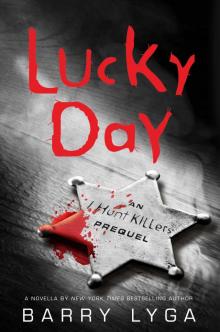 Lucky Day
Lucky Day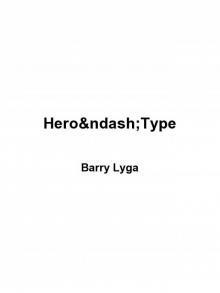 Hero-Type
Hero-Type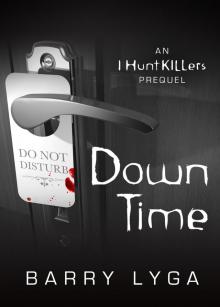 Down Time
Down Time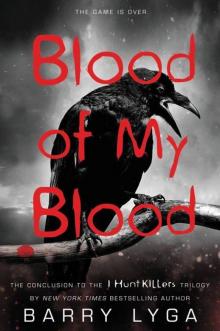 Blood of My Blood
Blood of My Blood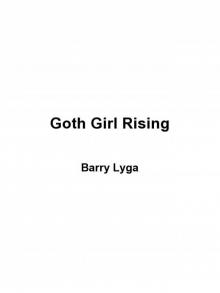 Goth Girl Rising
Goth Girl Rising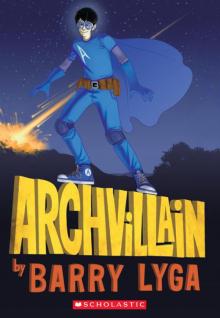 Archvillain
Archvillain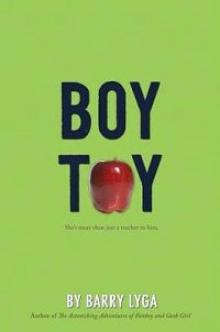 Boy Toy
Boy Toy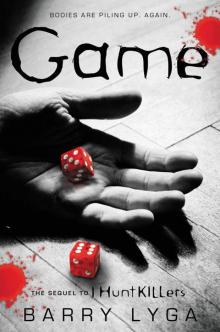 Game
Game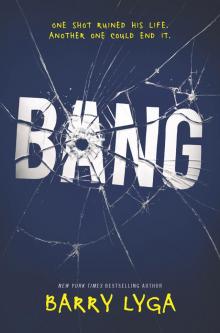 Bang
Bang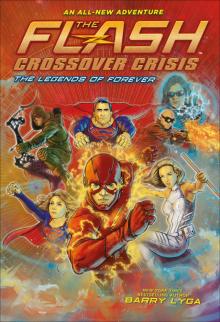 The Legends of Forever
The Legends of Forever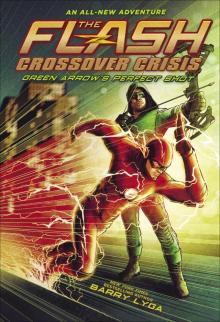 The Flash: Green Arrow's Perfect Shot
The Flash: Green Arrow's Perfect Shot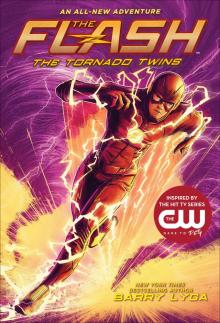 The Flash: The Tornado Twins
The Flash: The Tornado Twins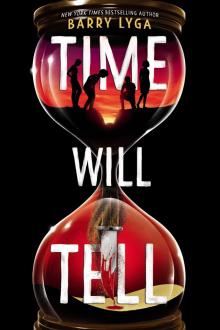 Time Will Tell
Time Will Tell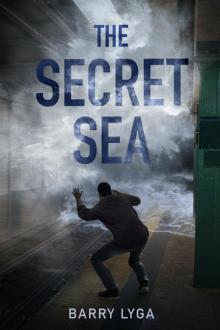 The Secret Sea
The Secret Sea The Hive
The Hive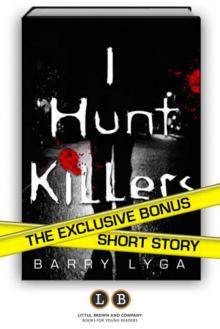 Career Day
Career Day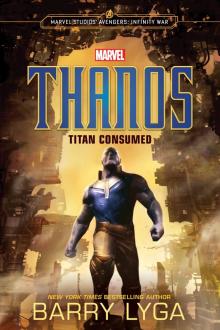 MARVEL's Avengers: Infinity War: Thanos
MARVEL's Avengers: Infinity War: Thanos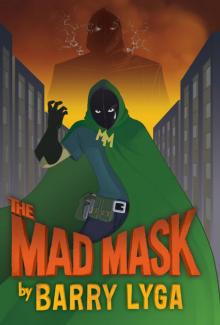 The Mad Mask
The Mad Mask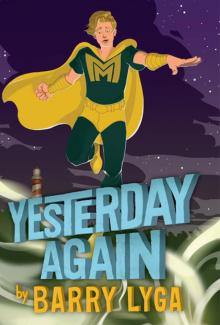 Yesterday Again
Yesterday Again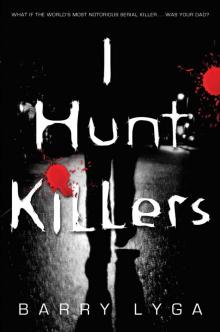 I Hunt Killers
I Hunt Killers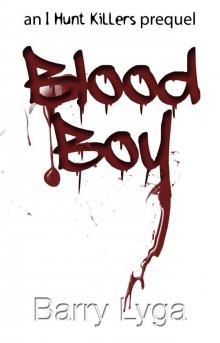 Blood Boy
Blood Boy Neutral Mask
Neutral Mask The Astonishing Adventures of Fanboy and Goth Girl
The Astonishing Adventures of Fanboy and Goth Girl I Hunt Killers Neutral Mask
I Hunt Killers Neutral Mask Neutral Mask: an I Hunt Killers prequel
Neutral Mask: an I Hunt Killers prequel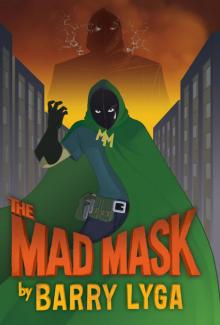 Mad Mask
Mad Mask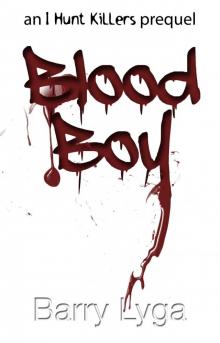 Blood Boy: an I Hunt Killers prequel
Blood Boy: an I Hunt Killers prequel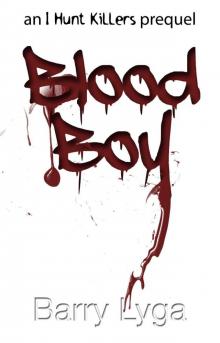 I Hunt Killers Blood Boy
I Hunt Killers Blood Boy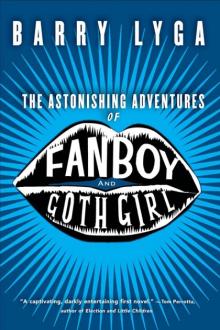 The Astonishing Adventures of Fan Boy and Goth Girl
The Astonishing Adventures of Fan Boy and Goth Girl